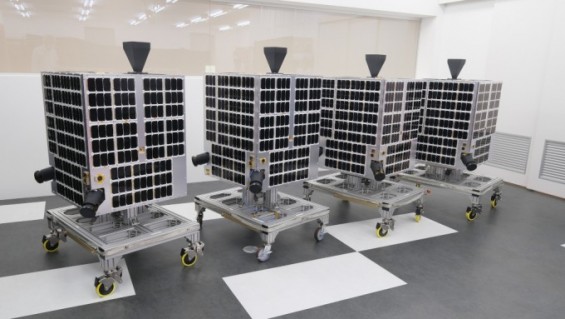
Axelspace, a Japanese space development company, will send a small satellite’GRUS’ 1B·1C·1D·1E satellite for earth observation service to the Russian Soyuz 2.1a launch vehicle at the Baikonur Space Center in Kazakhstan on the 20th. Provide Accel Space
Japanese space company’Axel Space’ sends four micro-satellites to space to provide earth observation services. It is expected to be launched on the Russian Soyuz 2.1a launch vehicle at the Baikonur Space Center in Kazakhstan at 15:07 on the 20th, along with the Korean-developed Earth Observation Satellite’Next Generation Medium-Sized Satellite No. 1′. It is attracting attention as an attempt to mass-produce and launch a satellite for the first time in Japan.
Yamazaki Yasunori Axelspace Chief Business Officer (CBO) said in a video interview on the 18th, two days before the launch, “It was the first time that a mass-production satellite was developed and launched in Japan, so there were many difficulties in development.” Did not hide.
Axelspace is a company that operates’Axel Globe’, a service that provides photographic data of the entire earth by floating dozens of 100kg-class micro-satellites in space. It was founded in August 2008 by Yuya Nakamura, who is in charge of the CEO. Axel Globe’s goal is to provide customers with information that changes every day by observing changes on the planet every day. It is also possible to photograph agricultural land to see the crop status or to analyze economic activity by photographing a port.
There are four satellites launched this time, including’GRUS’ 1B·1C·1D·1E, the 2nd to 5th satellites for Axelglobe service. Earlier, Axelspace successfully launched GRUS 1A, the first satellite for Axelglobe service, in December 2018. The GRUS satellite is the size of a small refrigerator, 60 cm wide and 80 cm long. Every day, the Earth is photographed with a high-resolution camera that can distinguish 2.5m-sized objects while moving in a 600km solar synchronous orbit that can pass a specific area at the same time each time. That’s enough to tell a single car apart.

This is a screen of’Axel Globe’, an earth observation service provided by Axelspace. Provide Accel Space
The production of GRUS 1B·1C·1D·1E satellites was developed in the form of mass production to produce twin satellites with all the same functions. The satellite mass production system is a process that must be prepared in order to provide services for cluster satellites operating multiple satellites and to create price competitiveness. Korea’s next-generation medium-sized satellite 1, launched this time, was also developed in the form of a platform necessary for the satellite mass production system to foster the private industry. This is the first time in Japan, which is regarded as a powerhouse in space development, a satellite mass production system. Yamazaki CBO said, “Unlike creating a satellite alone, it was most important to cooperate with other companies.”
With this launch, Axelglobe is expected to be sophisticated enough to be used in the actual industry. Yamazaki CBO said, “If you increase the number of satellites to five, you can reduce the number of shots of the same place every two weeks to once every two to three days. For example, if you use it for agriculture, you can more accurately check the growth of crops. ”He explained. Axelspace aims to increase the number of satellites to 10 by 2023 and shoot the same spot once a day.
Regarding the strength of Axel Globe, CBO Yamazaki said, “People think that factors such as resolution will be important for the small satellite image market, but in the actual market, the service that suits the customer is more important. The advantage is that we have built a service that provides the right solution and resolves requests very quickly.”
Yamazaki CBO said, “I look forward to working with a data analysis company to create a market in Korea by working with a data analysis company.” Until recently, CBO Yamazaki introduced that he had been actively engaged in discussions with Korean companies that analyze images using AI.

Axelspace recently agreed with the Japan Aerospace Research and Development Organization (JAXA) to collaborate on research using the Axel Globe satellite. Provide Accel Space
In Korea, space startups have recently appeared, and private companies have announced that they will participate in the space industry. Yamazaki CBO said, “Deep tech such as the space industry, in particular, needs government support for its development,” and cited technology transfer and initial funding as the role of the government. He said, “It can become a kickstarter by developing technology that is expensive and risky for a small company with government funding,” he said. “In addition, if the government decides to support it, venture capital funding can also play a role in the space industry.”
He stressed that it is also important for the government to become customers to foster the space industry. Axelspace signed a memorandum of understanding with the Japan Aerospace Research and Development Organization (JAXA), which oversees space development in Japan, to add a thermal infrared sensor to the Axel Globe satellite in December last year and conduct disaster prevention research using new data. It was also decided to discuss ways to use it in various fields, such as monitoring fisheries resources and understanding plant utilization rates by linking the government’s large satellite and Axel Globe that can observe high-resolution observations.
Yamazaki CBO said, “As satellites are expensive, it is difficult to find the first customer. If the government takes the risk and becomes the first customer, other private companies will follow, creating an ecosystem and sustaining space startups. Will” he emphasized.

Yamazaki Yasunori CBO. Provide Accel Space
